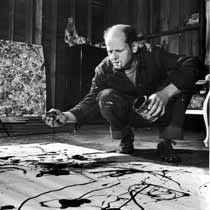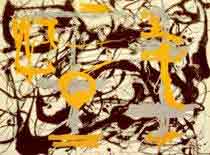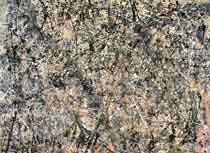FAITH LAPIDUS:
I'm Faith Lapidus.
BOB DOUGHTY:
And I'm Bob Doughty with PEOPLE IN AMERICA in VOA Special English. Today, we tell about the famous artist Jackson Pollock who helped redefine modern art in the United States. Pollock invented a new kind of painting that changed the way the world looked at art.
(MUSIC)
FAITH LAPIDUS:

Until the 20th century, most paintings were representational. This means that artists "represented" their subjects in a way that was realistic and recognizable. However, during the first half of the 20th century, artists like Jackson Pollock started to explore other methods of representation.
When he first began painting, Jackson Pollock painted representational objects such as people and animals. However, he is famous for helping to create a whole new art movement called Abstract Expressionism. An "abstract" image is one where the subject is not represented realistically. Instead, the artist uses color and shapes to suggest the most general qualities of the subject. "Expressionism" is a kind of art that expresses feelings and thoughts. Abstract Expressionism is art that shows emotions and ideas through non-representational forms.
BOB DOUGHTY:
In Pollock's most famous works, there is no recognizable subject. His art works are large surfaces of canvas completely covered in different colors of paint. However, Pollock did not start out as a revolutionary painter. He developed the artistic process he became famous for over many years.
(MUSIC)
FAITH LAPIDUS:
Jackson Pollock was born in Cody, Wyoming in 1912. He grew up in the states of Arizona and California. Pollock later said that the wide-open land of these western areas greatly influenced his expansive artwork. In 1930 he moved east to New York City where he studied at the Art Students League. There, Pollock spent a few years studying with the artist Thomas Hart Benton who painted images of every day American life. Pollock's early works are similar to his teacher's kind of painting. However, Pollock slowly left this traditional art education behind.
BOB DOUGHTY:
Pollock's work had many other influences. For example, he liked a group of Mexican painters who made murals. Murals are large images that the artists paint directly onto a wall. Some of these painters were working in New York City in the 1930s, so Pollock was able to see them work. Pollock borrowed several methods and ideas from these artists. They included the use of large canvases, the method of freely applying paint and honoring old and new traditions.
FAITH LAPIDUS:
Pollock was also influenced by the Spanish artist Miro. Miro was part of a movement of surrealist painters. Surrealist artists thought that true art comes from a part of the mind called the unconscious. The unconscious controls the area of the mind that produces dreams. Pollock agreed with these artists that the unconscious mind was an important force in creating art.
Also, when he was in his late 20s, Pollock suffered a mental breakdown. It was caused in part by depression and dependence on alcohol. As a result, he was treated by a Jungian psychoanalyst. This is a special kind of expert in emotional health who works to understand the unconscious mind, dreams, and emotions. Pollock was influenced by this kind of investigation of human relations and emotions. This "inside world" would become the subject of his paintings.
BOB DOUGHTY:

In 1944, Pollock married Lee Krasner who was also a skilled Abstract Expressionist painter. The next year they moved to East Hampton, a small town on Long Island in the state of New York. The couple wanted to get away from the busy life of New York City. In this country environment they could enjoy nature and have more time to work on their art.
Next to their house Pollock set up a studio building where he could create his artwork. In this large studio Pollock created the paintings that would make him famous.
(MUSIC)
FAITH LAPIDUS:
During these years Jackson Pollock started to paint in a completely new way. He created art that was very physical. In fact, his method is sometimes called "action painting". Most artists painted on a surface that stood upright or vertical. But Pollock put his large canvases on the floor so that he could move around all four sides of his work. He also used very liquid paints so that he could easily drop the paint onto his canvases. This "dripping" method allowed him to make energetic works.
His paintings are explosions of curving lines, shapes and colors. In his art you can see every movement that his arm made. You can see how he had to move his body around the canvas. Videos of Pollock painting show this process, which looks like a painterly dance.
BOB DOUGHTY:
Unlike other artists, Jackson Pollock did not plan the way he wanted his paintings to look. Many artists plan their works by making small drawings before painting. Pollock developed what he called a "direct method," applying the paint directly onto an empty canvas. He painted by following his immediate thoughts and emotions. Pollock combined careful movement with exact color and line. Though his paintings appear accidental, they required careful control.
Here is a recording of Pollock describing his way of painting. It was taken from a movie the British Broadcasting Corporation made about the artist in 1999.
JACKSON POLLOCK: "Sometimes I use a brush but often prefer using a stick. Sometimes I pour the paint straight out of the can. I like to use a dripping, fluid paint. A method of painting is a natural growth out of a need. I want to express my feelings rather than illustrate them."
FAITH LAPIDUS:
As Pollock said, he wanted to create art that was a visual representation of the motion and energy of his "inside world." He was once asked why he did not paint pictures of objects people could identify. He answered that if you wanted to see a flower, you could go look at a real one. He said that what interested him was not outside objects.
Pollock's works were both praised and criticized. His paintings were in several shows in galleries in the middle 1940s. However, Pollock did not produce his fully abstract "drip" paintings until later. In 1950, the public saw these works at Betty Parson's Gallery in New York. Some art critics said this was one of the best shows of the year and that Pollock was one of the greatest painters in America. Others did not understand his work. One critic said that Pollock's art showed chaos -- complete disorder without any method.
BOB DOUGHTY:

Today, Pollock's works sell for millions of dollars. But only one painting sold at this show. It was a famous work called "Lavender Mist". This painting now hangs in the National Gallery of Art in Washington, D.C. "Lavender Mist" represents perfectly what was so interesting about Pollock's work. The canvas is more than two meters tall and almost three meters long. The entire surface is covered in small rivers of white, black, grey, yellow, brown and pink paint. These colors and lines create a painting that is full of visual energy.
FAITH LAPIDUS:
Interestingly, there is no lavender, or light purple, color paint in this work. One of Pollock's friends suggested the name because the many other colors of paint created an atmospheric effect that looked like lavender mist. Usually, Pollock would simply name his paintings with a number and a date. He did not want the titles to explain to viewers what to see when they looked at his work.
With paintings like "Lavender Mist" Jackson Pollock helped introduce the world to a whole new way of painting and thinking about art. But he did not live very long. He died in a car accident in 1956 at the age of 44.
(MUSIC)
BOB DOUGHTY:
The home in East Hampton, New York where Jackson Pollock lived with his wife Lee Krasner is now a museum. At this special place you can see the rooms where these artists lived. Most importantly, you can see the studio where Pollock and Krasner created their work. On the floor of the studio is the evidence of years and years of Pollock's thrown paint. The floor looks just like one of Pollock's paintings.
Experts say this museum is a cultural treasure. It is the place where Jackson Pollock helped introduce the world to Abstract Expressionism. Pollock helped break the traditional rules of representation and established America as an important center for modern art.
FAITH LAPIDUS:
This program was written and produced by Dana Demange. I'm Faith Lapidus.
BOB DOUGHTY:
And I'm Bob Doughty. Join us again next week for PEOPLE IN AMERICA in VOA Special English.
mural: a painting, usually a large one, done on a wall, sometimes on an outside wall of a building 壁畫
Arthur Ashe, 1943-1993: tennis champion and civil rights activist
Pioneers who shaped the sounds of radio
Scott Joplin, 1867-1917: The king of ragtime music
Margaret Mead: a public face of Anthropology
(來源:VOA 編輯:陳丹妮)
